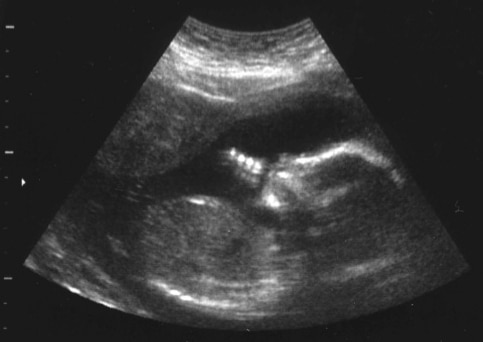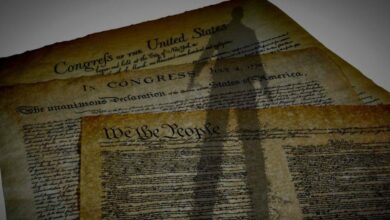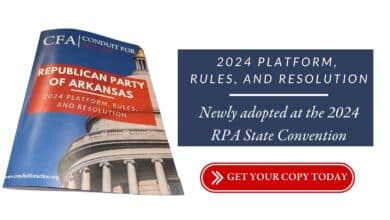Is Work Group a Threat to FOIA?
By David Ferguson
Attorney General Tim Griffin announced he has formed a work group to consider “modernization” of the Freedom of Information Act (FOIA) and the meetings of the work group will not be open to the public. Griffin wants to use ideas from the work group to propose legislation amending the FOIA in the 2025 session of the Arkansas General Assembly.
Griffin’s announcement was immediately met with criticism, including editorials and letters to the editor in the Arkansas Democrat Gazette. Criticism came from FOIA supporters who fear Griffin will use his work group to undermine the FOIA and to undermine the Freedom of Information Task Force established by law.
(The FOIA is a law giving rights to the public to attend most government meetings and to see government documents. The FOIA is a big deal. It is a good government law protecting the public and it is worth defending.)
Criticisms of the Attorney General and his work group are rooted in the fact that Griffin supported HB1726 of 2023, which FOIA defenders described as a “FOIA killer.”
Some critics say the goal of modernizing the FOIA is so broad it could include anything, and they fear it might even include legislation to dismantle FOIA protections.
When I saw the word “modernize” my first thought was of using technology to store more documents on the internet and adopting procedures to make it easier to store and retrieve, and, if necessary, redact documents. But obviously, the work group is not an information technology group, so that is not what it means.
I agree the word “modernize” doesn’t tell us anything. The word is similar to other political words such as “reform” or “common sense legislation” in that their meanings vary widely based on the person’s intent. But the vagueness of that term does not mean it is being used as cover for proposing something like HB1726.
Let’s look at the criticisms made by some FOIA defenders about the work group:
- Critics say Griffin’s work group undermines the Arkansas Freedom of Information Task Force, which was created by law. The FOI Task Force has been protective of the FOIA.
- The work group’s closed meetings have been criticized as conflicting with the open meetings requirements of the FOIA or at least the spirit of the FOIA.
- The seven-member work group has been criticized because it includes both legislators who sponsored HB1726, and two of the Attorney General’s employees, one of whom helped a sponsor present the bill in the House committee. Critics are concerned the inclusion of these members is a sign the work group was set up to push through another version of HB1726.
While I understand why critics are concerned about the possibility of having to fight another version of HB1726, I disagree with these three criticisms.
Before addressing the criticisms, it will be helpful to back up and talk about HB1726.
- HB1726 pitted the interests of government employees, who have been complaining about abuses of the FOIA and about its workload, against the interests of citizens who want to protect their free access to government information. The bill took the side of the government employees.
- Some of the limitations on the FOIA that were proposed in the bill include: 1. Exemptions from disclosure for a broader category of documents related to criminal investigations; 2. An exemption from disclosure for information that is the subject of consultations with the government’s attorneys; 3. Charging the public fees for providing documents, even sometimes at contractor rates, if retrieving the information becomes time consuming, (Under the bill the fees would have been imposed regardless of the requestor’s ability to pay); and 4. Giving government employees a much longer time to respond to FOIA requests.
- Despite HB1726 being filed late in the legislative session and there having been only a short time between introduction of the bill and the committee hearing, many people turned out to oppose the bill. So many members of the public wanted to speak on the bill that the hearing lasted three hours, and this despite the committee imposing a five-minute limit on each person’s testimony.
- Prior to the hearing by the House Committee on State Agencies and Governmental Affairs, the Arkansas Freedom of Information Task Force met and unanimously voted to oppose HB1726. The task force’s unanimous opposition is impressive considering a majority of the members of the task force are appointed by public officials.
- Only five of the twenty members of the committee voted for the bill.
The much ridiculed HB1726 serves as a reminder that sometimes solutions are worse than the problem, and that even otherwise good legislators can sometimes sponsor bad legislation.
Let’s look at the three criticisms of the Attorney General and his work group.
FIRST, critics say Griffin’s work group undermines the Arkansas Freedom of Information Task Force[i] which was created by law to study the FOIA and which has been protective of the FOIA.
I disagree with their assessment. Griffin’s work group is not intruding on the domain of the Arkansas Freedom of Information Task Force. Why? For the simple reason that the FOI Task Force has never had an exclusive claim to FOIA issues. Anyone can study the FOIA and make recommendations. Even the Arkansas General Assembly, which created the task force to give the legislature advice, is free to do its own studies of FOIA issues. In fact, several witnesses who opposed HB1726, encouraged the legislature to do just that. It is also worth noting that the FOI Task Force can’t even compel legislators to submit proposed legislation to the task force for their review.
I hope Attorney General Griffin will commit to submitting any legislation coming out of his work group to the FOI Task Force for comment. Such a commitment might go a long way in diffusing criticism.
SECOND, the work group’s closed meetings have been criticized as being in conflict with the open meetings requirements of the FOIA or at least the spirit of the FOIA.
The facts don’t support this claim. The current guidance under the FOIA Handbook says the law is not clear on advisory groups and until it is clarified advisory groups (such as this work group) are to be considered exempt from the FOIA.[ii] As for violating the spirit of the FOIA, if that was true then you would also have to say the FOIA law conflicts with itself since the law includes specific exemptions to the open meetings requirement.
Although current guidance indicates the Attorney General’s work group can meet privately, doing so when it involves the FOIA has been a PR nightmare.
By the way, the Arkansas Freedom of Information Task Force is also an advisory group, and it appears under current guidance they, too, could meet in secret. Obviously, that notion would be offensive to the FOI Task Force. Should all advisory groups be exempt? Some of them? Clarifying the law on advisory groups sounds like a good subject for the FOIA task force to study.
THIRD, the seven-member work group has been criticized because it includes both legislators who sponsored HB1726, and two of the Attorney General’s employees, one of whom helped present the bill in the House committee. Critics are concerned this is a sign the work group was set up to push through another version of HB1726.
Yes, the two sponsors of HB1726 are members of the work group, but when you look at the full membership of the work group, I think it shows a different picture. The Attorney General also included three members who are known as defenders of the FOIA. They are: (1) Senator Clark Tucker who during the most recent legislative session and in a previous session cosponsored legislation intended to strengthen the FOIA; (2) John Tull III who serves as the general counsel to the Arkansas Press Association and who received the Arkansas Press Association’s Freedom of Information Award in 2018; and (3) Ashley Kemp Wimberley who is the executive director of the Arkansas Press Association.
If the goal was to create a work group to push through a new version of HB1726 then having these three members on the work group was a very bad plan. They could easily derail the effort by going public with criticisms of the work group or make headlines by resigning in protest.
Criticism of the work group necessarily criticizes Tucker, Tull, and Wimberly for being on the work group. I think that is unfair.
MY CONCLUSION
Attorney General Griffin’s support for HB1726 will remain a concern for FOIA defenders. Because of that, any FOIA legislation proposed by the Attorney General will get extra scrutiny.
Based on the membership of the work group, any change undermining the FOIA will likely be a hard sell, and finding common ground on changes will likely to be a difficult task.
Bills on the FOIA won’t just originate from the Attorney General’s work group and HB1726 wasn’t the only bill on FOIA in 2023. Every bill proposing change needs to be carefully reviewed, but the task is difficult because legislative sessions are short. Will you be watching?
David Ferguson is a former Director of Arkansas’ Bureau of Legislative Research, having a thirty-two-year career as an attorney for the Arkansas legislature. After retirement from state service, his primary focus has been beef cattle farming. He is also a former officer of Conduit for Action.
[i] Arkansas Code § 25-19-111
[ii] FOIA Handbook 20th Edition: Does the FOIA’s open meeting requirement apply to an advisory body that does not include members of the larger governing body to which it reports? Answer. This is not entirely clear under the FOIA or current case law. Until clarified, the requirement can be construed to apply only to “governing bodies,”i.e., those with final decision-making authority or whose recommendations are routinely rubber-stamped (so called“de facto”governing bodies). Op. Att’y Gen. 2014-124.






